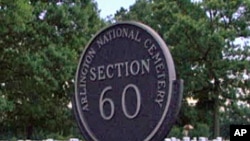The last Monday in May is "Memorial Day" in the United States, a day of remembrance for the country's military war dead. This year's observance comes as the number of casualties in Afghanistan has surpassed 1,000.
Row upon row of headstones in America's Arlington National Cemetery. Ten thousand people are expected to visit here in observance of Memorial Day. The cemetery started as a burial ground for American Civil War dead. And now more than 330,000 are buried here. On Memorial Day, the day Americans remember the fallen, the president or vice president traditionally lays a wreath at the Tomb of the Unknown - this is the scene from last year. Kaitlin Horst is the cemetery's spokeswoman.
"As Americans, I think we have a sense of pride, pride in our country, pride in what we stand for and we also have a sense of pride in our military - what our military has done over the course of our nation's history, to defend the rights and freedoms that we hold dear," said Kaitlin Horst.
More than 600 from the wars in Iraq and Afghanistan lie in section 60. It is called "the saddest acre in America."
It is here that U.S. Joint Chiefs of Staff Chairman Mike Mullen, U.S. and NATO Commander General Stanley McChrystal and Afghanistan President Hamid Karzai strolled through the rows earlier this month. It was Mr. Karzai's first visit to this section.
American casualties in the nine-year Afghan conflict surpass 1,000. Half of those have died in the past two years.
Analysts blame the sharp increase on the turbulent national elections and a re-emerging Taliban facing a surge of U.S. troops, determined to take the provinces. Military leaders expect this level of violence to continue.
"I have said we expect this to be a tough year," said Joint Chief's Chairman, Admiral Mike Mullen. "And in fact, the insurgents - you know, the poppy season is over - they have gone back to get their weapons. It's that time of year. So that the violence level would rise doesn't - doesn't surprise me at all."
General McChrystal said during this visit to Arlington, he found the headstones of soldiers who had worked with him.
"Every single casualty affects people, it affects leaders, but more importantly, it affects families, it affects children, it affects parents, spouses, so each one of them is sacred and I think we all know that," said General McChrystal.
Former Afghan Foreign Minister Abdullah Abdullah ran unsuccessfully for president last year. He says the key for getting out of Afghanistan is to gain the trust of the Afghan people and to explain the exit strategy.
"There is still support, but at the same time, there is growing desire to know how long this support should continue and the result," said Abdullah Abdullah.
Only then will Section 60 stop expanding...to hold more mourners for future Memorial Days.
US Looks Toward Memorial Day




